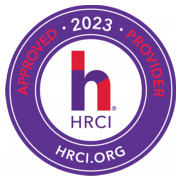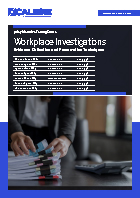| Date | Venue | Fee | |
|---|---|---|---|
| 20 Apr - 24 Apr 2026 | Dubai – UAE | $ 5,950 | Register Now |
| 15 Jun - 19 Jun 2026 | Istanbul - Turkey | $ 5,950 | Register Now |
| 31 Aug - 04 Sep 2026 | London - UK | $ 5,950 | Register Now |
| 09 Nov - 13 Nov 2026 | Dubai – UAE | $ 5,950 | Register Now |
| 11 Jan - 15 Jan 2027 | Dubai – UAE | $ 5,950 | Register Now |
About the Course
Nowadays, the ability to conduct thorough, fair, and efficient investigations is not just a necessity but a cornerstone of organisational success and employee well-being. This 5-day comprehensive Workplace Investigations training course examines the critical realm of workplace integrity and justice. It is designed to empower delegates with the essential skills and knowledge needed to navigate the complexities of workplace investigations with confidence and competence.
Effective workplace investigations are more than a procedural requirement; they are pivotal in maintaining trust, ensuring compliance with legal standards, and developing a supportive work environment. Delegates will gain a deep understanding of the legal and ethical frameworks that underpin investigations, equipping them to navigate potential pitfalls and challenges. Its focus extends beyond theoretical principles to practical application, offering insights from real-world case studies and industry best practices.
This training program provides a structured approach to every phase of the investigative process. From initial complaint response to evidence collection, witness interviews, analysis, and final reporting, each step is accurately explored to enhance delegates' investigative acumen. Moreover, they will learn to leverage advanced tools and techniques, ensuring that their investigations are thorough, efficient, and compliant.
Delegates will emerge equipped to conduct investigations that uphold fairness, protect organisational integrity, and promote a culture of accountability. Whether they are HR professionals, legal advisors, compliance officers, or managers seeking to sharpen their investigative skills, this provides an informative learning experience where clarity, diligence, and ethical rigor pave the way for a stronger, more resilient workplace environment.
Core Objectives
By the end of the training course, delegates will be able to:
- Gain a comprehensive knowledge of the legal and regulatory frameworks governing workplace investigations, ensuring compliance and minimising legal risks
- Identify and effectively address ethical dilemmas that may arise during investigations, promoting ethical decision-making and upholding professional integrity
- Develop proficiency in conducting thorough investigations from initial complaint receipt through to evidence collection, witness interviews, and final reporting
- Learn best practices for gathering, preserving, and analysing evidence, ensuring accuracy, reliability, and adherence to legal standards and organisational policies
- Acquire techniques to conduct effective and impartial interviews, eliciting crucial information while maintaining professionalism and respect for interviewees
- Implement strategies to recognise and mitigate biases and conflicts of interest that could compromise the objectivity and fairness of investigations
- Master the art of writing clear, concise, and objective investigation reports that accurately document findings, conclusions, and recommendations
- Develop skills to handle complex investigative dynamics
- Understand the importance of ensuring compliance with organisational policies, legal standards, and procedural fairness throughout the investigation process
- Learn techniques for implementing effective corrective actions and follow-up measures based on investigation findings
Training Approach
This training course integrates interactive lectures, case studies, practical exercises, group discussions, and role-playing activities. Delegates engage in dynamic lectures that cover legal frameworks, ethical considerations, and best practices, promoting a foundational understanding of workplace investigations. Real-world case studies and simulations provide opportunities to apply learned concepts in realistic scenarios, enhancing practical skills such as evidence gathering, interviewing techniques, and report writing. Group discussions encourage collaborative learning, enabling delegates to exchange insights and perspectives on ethical dilemmas and investigative challenges. Feedback sessions and expert panels offer guidance and diverse viewpoints throughout the program, ensuring delegates develop confidence and competence in conducting thorough, fair, and compliant workplace investigations.
The Attendees
This training course is ideal for Human Resources (HR) professionals responsible for managing employee relations and investigating workplace misconduct. Legal advisors and compliance officers must understand the legal and regulatory frameworks surrounding investigations. Additionally, risk management and corporate governance professionals will gain insights into mitigating legal risks and ensuring organisational integrity.
Likewise, it will be valuable to the professionals but not limited to the following:
- Human Resources (HR) Professionals
- Legal Counsel and Compliance Officers
- Managers and Supervisors
- Ethics and Integrity Officers
- Risk Management Specialists
- Employee Relations Specialists
- Industrial Relations Specialists
- Security and Loss Prevention Personnel
- Internal and External Investigators
- Compliance and Audit Professionals
- Business Owners and Executives
Daily Discussion
DAY ONE: UNDERSTANDING WORKPLACE INVESTIGATIONS
- Legal and Regulatory Considerations
- Ethical Challenges and Considerations for Investigators
- Investigator's Role and Responsibilities in Ensuring Fairness
- Impact of Effective Investigations on Organisational Culture
- Types of Workplace Misconduct and Their Implications
- Importance of Evidence Collection and Documentation
- Handling Sensitive Information and Maintaining Confidentiality
- Challenges and Strategies in Managing Investigator Biases
- Advanced Tools and Technologies for Maximising Investigation Efficiency
DAY TWO: PREPARATION AND INITIAL STEPS
- Responding Promptly to Complaints or Allegations
- Developing a Comprehensive Investigation Plan
- Defining the Scope and Objectives of the Investigation
- Effective Techniques for Collecting and Safeguarding Evidence
- Managing Electronic Evidence and Data Privacy Issues
- Identifying and Preparing to Interview Witnesses
- Conducting Pre-interview Assessments and Planning
- Addressing Confidentiality Concerns and Legal Constraints
- Strategies for Handling Emotional or Sensitive Situations
- Avoiding Conflicts of Interest and Maintaining Neutrality
DAY THREE: CONDUCTING EFFECTIVE INTERVIEWS
- Structuring and Conducting Effective Interviews
- Techniques for Eliciting Information and Probing Responses
- Handling Difficult or Uncooperative Interviewees
- Assessing Credibility and Reliability of Witness Statements
- Documenting interview Findings Accurately and Objectively
- Leveraging Technology and Forensic Tools during Interviews
- Ensuring Compliance with Legal Standards during Interviews
- Addressing Cultural and Linguistic Considerations
- Managing Interview Dynamics and Controlling the Process
- Reviewing and Validating Interview Transcripts and Recordings
DAY FOUR: ANALYSING EVIDENCE AND MAKING DECISIONS
- Methods for Analysing Evidence and Identifying Patterns
- Evaluating the Relevance and Reliability of Evidence
- Applying Investigative Techniques to Corroborate Findings
- Assessing the Impact of Findings on Organisational Policies
- Formulating Conclusions Based on Investigation Outcomes
- Documenting Findings and Preparing Investigation Reports
- Presenting Findings and Recommendations to Stakeholders
- Addressing Legal Implications and Compliance Requirements
- Reviewing and revising Investigation Reports for Accuracy
- Mitigating Risks Associated with Investigation Outcomes
DAY FIVE: CLOSING AND FOLLOW-UP
- Concluding Investigations with Clarity and Professionalism
- Communicating Outcomes Effectively to Involved Parties
- Implementing Corrective Actions and Preventive Measures
- Monitoring the Effectiveness of Implemented Actions
- Conducting Post-investigation Reviews and Evaluations
- Future Investigation Processes
- Addressing Legal and Ethical Obligations Post-investigation
- Supporting Organisational Resilience against Future Incidents
- Providing Feedback and Support to Stakeholders
Certificate Awarded
Upon successful completion of this training course, participants will be awarded a Certificate of Completion from XCalibre Training Centre, acknowledging their accomplishment. This certificate serves as a testament to their dedication to developing their skills and advancing their expertise in their respective fields.

Course Enquiry

A Human Resource Certification Institute (HRCI)® Pre-approved Training Course


